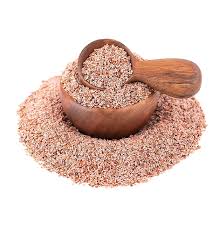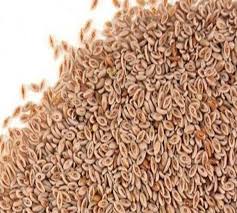Psyllium seeds are the small seeds derived from the Plantago ovata plant, primarily used to produce psyllium husk, a dietary fiber supplement known for its digestive health benefits.
Psyllium seeds, primarily in the form of psyllium husk, have several uses:
- Digestive Health: Psyllium husk is a natural laxative that helps relieve constipation by promoting regular bowel movements.
- Cholesterol Management: It may lower LDL (bad) cholesterol levels, contributing to heart health.
- Blood Sugar Control: Psyllium husk can help stabilize blood sugar levels, particularly in people with diabetes.
- Weight Management: It aids in weight management by promoting a feeling of fullness and reducing appetite.
- Gut Health: It serves as a prebiotic, promoting the growth of beneficial gut bacteria.
- Gluten-Free Baking: Psyllium husk is used in gluten-free baking to improve texture and binding in recipes.
- Culinary Uses: Some cuisines use it as a thickening agent in dishes.
- Dietary Supplement: Available in various forms (capsules, powder), it’s used as a dietary supplement for various health goals.
Always consult a healthcare professional before using psyllium seeds or husk as a supplement, especially if you have underlying health conditions or take medications.
Psyllium seeds, also known as “Isabgol” or “Isabgul” in Hindi, have different regional names in various parts of India due to linguistic and cultural diversity. Here are some regional names for psyllium seeds:
- Iskol: In Bengali, psyllium seeds are referred to as “iskol.”
- Isafgol: In Punjabi, they are known as “isafgol.”
- Isapghul/Ispaghula Beej: In Urdu and some North Indian languages, psyllium seeds are called “isapghul” or “ispaghula beej.”
- Sat Isabgol: In Gujarati, psyllium seeds may be referred to as “sat isabgol.”
- Isufgol: In Kannada, they are known as “isufgol.”
- Isabgulki Beegu: In Telugu, psyllium seeds are referred to as “isabgulki beegu.”
- Ishabgola Beeja: In Marathi, they may be called “ishabgola beeja.”
- Isapu Golu: In Tamil, they can be known as “isapu golu.”
These regional names reflect the linguistic and cultural diversity of India, where different languages and dialects have their own terms for the same natural product.







Reviews
There are no reviews yet.